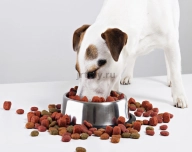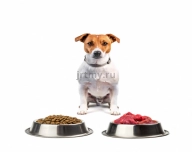Feeding natural food
Feeding natural food
Every food product has its health benefits because of the nutrients it contains. But there is no food that contains everything!

Therefore, if you have chosen natural foods to feed Jack, respect the principle of rotation: foods must be varied. This variety ensures that Jack gets all the necessary nutrients that we talked about earlier.
If you introduce a new product into Jack's diet, Jack may at first refuse it, not because he doesn't need it, but simply because it is unfamiliar. Introduce new foods gradually, in small portions.
So, your Jack's diet must include the following foods.
Meat: This can be beef, lean lamb, chicken, turkey, beef by-products such as heart, liver, and tripe. Raw meat has a higher energy value and is easier to digest than cooked meat. However, raw meat may contain helminth eggs, so it is better to freeze it first.
Do not give pork, which is too fatty a food for Jack and can cause diarrhea.
Fish. Give only saltwater fish, no bones. The nutritional value of fish is less than that of meat, so a portion of fish should be about twice as large.
Dairy products. Lean cottage cheese, kefir, sour milk, cheese are rich sources of protein and easily digestible fats, vitamins, and minerals. However, the number of dairy products in the diet should be limited because of their high protein content. Milk in its pure form contains lactose and can cause digestive upset, so it is better not to give it to Jack.
Eggs are also a good source of protein. Give hard-boiled eggs.
Cereals. Oatmeal, millet, rice, buckwheat, corn grits, and semolina. These are excellent sources of carbohydrates. Cereals should be boiled in water.
All kinds of vegetables, such as carrots, celery, pumpkins, cucumbers, apples, herbs, and so on should be given raw, grated, or finely chopped. You can boil the vegetables before eating them, but they lose vitamins from heat treatment. Do not give your Jack potatoes, onions, garlic, turnips.
When creating a menu for your pet, combine foods in different variations.
The standard combination is meat-cereal-vegetables.
Meat and fish should be given in pieces, but not as minced meat. The fact is that in the dog's stomach minced meat does not have time to be digested and in a semi-digested form is excreted into the intestines, where the putrefactive processes begin, resulting in digestive disorders.
You can prepare the food right before feeding or you can prepare the formula in advance and freeze it, dividing it into portions. This is very convenient, just take out one bag and defrost it in time for the meal.For a Jack weighing 5 kg the daily portion of food should be 250-300 g. And the amount of meat should be 10 g per 1 kg of weight, i.e. meat is only 20% of the daily ration.
If Jack hasn't eaten his breakfast or dinner within 15-20 minutes, put the bowl away and throw the food away or it will spoil.
As you can see, organizing a proper "straight food" diet for Jack is, on the one hand, quite affordable, but on the other hand, quite time-consuming. We all live in the age of speed, in noisy metropolitan areas, but always do not roll a couple of hours in a day. Of course, a busy, working owner will find it very problematic to prepare food for his Jack, even to diversify the menu. There's a big risk of slipping down to just feeding meat, forgetting about all the other essential elements of nutrition.
But if you find some free time for your pet, you get some advantages over feeding ready-made foods:
- You know the composition of the products in Jack's diet and you can control their quality yourself.
- Natural foods are free of preservatives, flavorings, colorings, and other chemicals that are so popular nowadays.
- Natural foods are much more readily eaten by Jackie than dry food.
- Natural foods rarely cause allergies, which is important for Jacks, who are fairly allergic to dogs.



